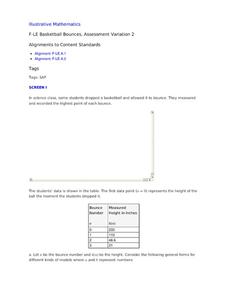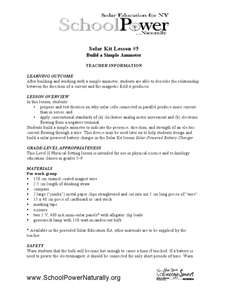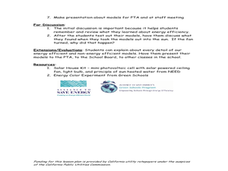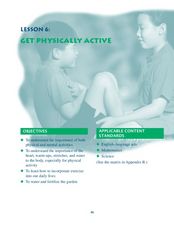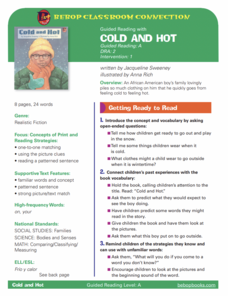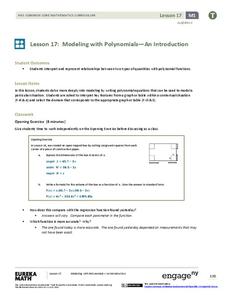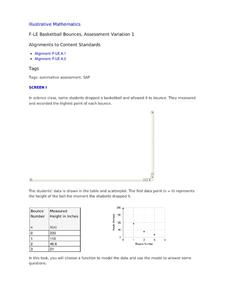Missouri Department of Elementary
What Are Safe and Unsafe Drugs/Medicines/Objects?
Encourage responsible decision-making while boosting sorting skills with a lesson that looks at safe and unsafe situations. Scholars use two bags, one happy the other sad, to sort scenario cards. After a thorough examination,...
Statistics Education Web
You Will Soon Analyze Categorical Data (Classifying Fortune Cookie Fortunes)
Would you rely on a fortune cookie for advice? The lesson plan first requires future statisticians to categorize 100 fortune cookie fortunes into four types: prophecy, advice, wisdom, and misc. The lesson plan goes on to have learners...
National Wildlife Federation
Master P in the House: An All School Energy and Climate Change Plan
A person in the US uses 20 times more energy than a person in India—that's a drastic difference! The final lesson in the 12-part series goes back to the initial energy audits, analyzes which room showed the most conservation of energy,...
Curated OER
A Horse of a Different Color
Elementary schoolers explore the wide variety of horse coat colors and reproduce an existing color as well a create their own horse coat color. There are two fine worksheets embedded in this plan that learners use to crete these coat...
Ohio Department of Education
Describing and Creating Plane Figures - Grade One
Young mathematicians draw, create, and describe different shapes using triangles. They discuss attributes of the original and created shapes. Pupils classify the created shapes and draw and write in mathematics journals to communicate...
Curated OER
Tracking the Salt Front
Using the Hudson River as the focus, learners discuss the difference between salt water and fresh water environments, analyze maps and graphs, and complete addition and subtraction problems. This lesson comes with a wealth of...
Asian Art Museum
Create Your Own Samurai (Breastplate) Armor
Your class is going to love this activity. They get out their rulers, cardboard, and paints as they make Samurai breastplates. The simple art lesson lends itself to many different subjects such as, math/measurement, world history, and...
Friends of Fort McHenry
Cannons During the War of 1812
During the Battle of Baltimore in the War of 1812, only 25% of the bombs and rockets fired at Fort McHenry actually reached their target. Using an interactive online simulation, combine your historical study with physics and...
Curated OER
What Goes Down Must Come Up
Third graders explore the capillary action of plants. They discover what makes paper "grow" when water is dropped on it. Pupils observe how paper reacts as it absorbs water. Students use a variety of saturate solutions to grow crystals,...
Curated OER
Basketball Bounces, Assessment Variation 2
This un-scaffold summative assessment tasks learners to use the height of a bouncing basketball, given the data in graph and table form, to choose the model that is represented. Learners then use the model to answer questions about...
Curated OER
An Electro-Olympic Event: Lemon vs. Lime
Students design a battery, identify and label the anode, cathode, electron flow, ion flow, oxidation & reduction reactions, chemicals used including the location of each;and distinguish between anode materials with regard to energy...
Curated OER
2nd Grade - Act. 27: How Animals Prepare for Winter
What do animals do during the winter? Second graders will discover that some animals migrate and other hibernate during the winter. Using "How and Why Animals Prepare for Winter," by Elaine Pascoe, they will discuss and create a drawing...
Curated OER
Classroom Archaeology
Students, in groups, receive a box of artifacts. They record their findings and discuss what the items would have been used for. They come together at the end of the lesson to share their findings.
Curated OER
Action-Reaction! Rocket
Students construct a rocket from a balloon propelled along a guide string. They use this model to learn about Newton's three laws of motion, examining the effect of different forces on the motion of the rocket. They measure the distance...
Curated OER
Solar Kit Lesson #5 - Build a Simple Ammeter
Emerging electricians build a simple ammeter for making measurements on an electric current. They test the placement of solar cells in both series and parallel circuits and examine the magnetic field produced by the movement of electrons...
Curated OER
Crafting Models of Efficiency
Students build and compare models of both an energy inefficient and efficient classroom. In this energy efficiency lesson, students creatively use recycled materials to build two separate classroom models. They factor in concepts such as...
Teach Engineering
Energy Efficiency
Using the resource is probably the most efficient way to learn about efficiency. The 18th installment of a 25-part Energy Systems and Solutions unit has pupils investigate energy efficiency through discussions and associated activities....
Alabama Learning Exchange
Polygons-Changing Area Versus Changing Perimeter
Investigate the area and perimeter of polygons in this geometry activity. Young geometers use grid paper to draw a quadrilateral and calculate its area and perimeter. They also read The Greedy Triangle to identify the changing shape of...
Curated OER
Get Physically Active
Students discover the importance of water. In this physical education science lesson, students consider mental and physical activities. Students find their pulse and measure their heart rate. Students discuss the importance...
Curated OER
Guided Reading: Cold and Hot
Explore the text, Cold and Hot, with comprehension strategies for young readers. First, give them a purpose for reading: find out what the boy wore outside in the snow! Then have them use one-to-one matching and picture clues to...
EngageNY
Modeling with Polynomials—An Introduction (part 2)
Linear, quadratic, and now cubic functions can model real-life patterns. High schoolers create cubic regression equations to model different scenarios. They then use the regression equations to make predictions.
Curated OER
Gravimetric Determination of the Nonvolatile Content of Paint
Here are the instructions for leading your advanced chemists though the process of measuring the nonvolatile components in a sample of paint. No student handout is provided, so you may want to create one based on the procedure explained....
Curated OER
Acids and Bases: Cabbage Juice Indicator
Fifth graders perform tests to identify acids and bases. For this chemistry lesson, 5th graders identify common household substances as acids or bases using cabbage juice indicator strips.
Curated OER
Basketball Bounces, Assessment Variation 1
This highly scaffolded, summative assessment tasks learners to choose the model that represents the height of a bouncing basketball given the data in graph and table form. Learners then use the model to answer questions about the...









